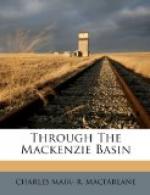The next day was treaty day, and we were still a long way from the treaty post. The Police, not yet hardened to the work, felt fagged, but would not own up, a nephew of Sir William Vernon Harcourt bringing up the rear, and all slithering, but hanging to it with dogged perseverance. Nothing, indeed, can be imagined more arduous than this tracking up a swift river, against constant head winds in bad weather. Much of it is in the water, wading up “snies,” or tortuous shallow channels, plunging into numberless creeks, clambering up slimy banks, creeping under or passing the line over fallen trees, wading out in the stream to round long spits of sand or boulders, floundering in gumbo slides, tripping, crawling, plunging, and, finally, tottering to the camping-place sweating like horses, and mud to the eyes—but never grumbling. After a whole day of this slavish work, no sooner was the bath taken, supper stowed, and pipes filled, than laughter began, and jokes and merriment ran round the camp-fires as if such things as mud and toil had never existed.
The old Indian, Peokus, heading the Police line, was a study. His garb was a pair of pants toned down to the colour of the grime they daily sank in, a shirt and corduroy vest to match, a faded kerchief tied around his head, an Assomption sash, and a begrimed body inside of all—a short, squarely built frame, clad with rounded muscles—nothing angular about him!—but the nerves within tireless as the stream he pulled against. On the lead, in harness, his long arms swung like pendulums, his whole body leant forward at an acute angle, the gait steady, and the step solid as the tramp of a gorilla. Some coarse black hairs clung here and there to his upper lip; his fine brown eyes were embedded in wrinkles, and his swarthy features, though clumsy, were kindly—a good-humoured face, which, at a cheerful word or glance, lit up at once with the grotesque grin of an animated gargoyle. This was the typical old-time tracker of the North; the toiler who brought in the products of man’s art in the East, and took out Nature’s returns—the Indian’s output—ever since the trade first penetrated these endless solitudes.
The forest scenery now became very striking; primeval masses of poplar and birch foliage, which spread away and upward in smoothest slopes, like vast lawns, studded with the sombre green of the pine tops which towered above them. Here and there the bends of the river crossed at such angles as to enclose a lake-like expanse of water. The river also took a fine colouring from its tributaries, a sort of greenish-yellow tinge, and now became flecked with bubbles and thin foam, so that we feared the freshet, which would have been disastrous.




